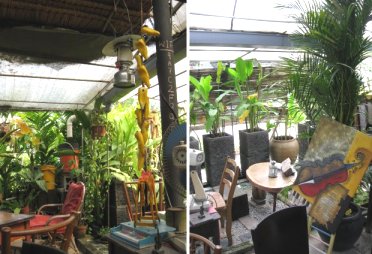As I'd previously reported, Tunku Halim's stories are being republished electronically. I'd just had a chunk of 44 Cemetary Road dropped into my mailbox, which I've had to psyche myself up to edit - that's how disturbing the stuff is.
Also, the travelogue of a cyclist who toured the "four corners" of Peninsular Malaysia as part of a duo is now in the final stages of design and checks.
I'm putting the page for manuscript solicitations up after the Chinese New Year holidays. I'm not expecting an inundated mailbox (or even a joke e-mail) within weeks of it going up, but I'd rather play it safe.
- Happening elsewhere: e-books and e-publishing. The Czech Republic has seen rising e-book sales. Catching on to the e-buzz, some have proffered tips and thoughts on how to catch the wave.
Meanwhile, Chinese B2C e-commerce site Dangdang expects a 20% profit margin on e-books. The company's plan to grow its e-book business is kind of ambitious, and highlights China as a plum market. But only if more publishers sign up; concerns include copyright protection short-term effects on business, and piracy.
Speaking of which: Recently, a bunch of Chinese writers announced their intent to sue Apple for allegedly hosting pirated e-books. And, asks this article, "who owns the e-book rights to books published years before there was such a thing?"
Still, the e-book explosion is good news for Amazon, which looks more and more the e-publishing monopoly feared by the traditional publishing sector. It seems Kindle Direct Publishing authors and publishers LOVE Kindle Owners' Lending Library. Celebrities such as James Franco and celebrity librarian Nancy Pearl are choosing to collaborate with Jeff Bezos's behemoth firm. - Mention e-publishing and indie comes to mind. Mention both and Amanda Hocking comes to mind. Just last week, it was the Guardian's turn to profile her. It should be noted that this member of the Kindle Million Club (authors who have sold one million or more e-books via Amazon's Kindle) had turned to traditional book publishers to relieve herself of the burden of marketing her books so she can write. With Amazon becoming a one-stop-shop for publishing, selling and lending books, one wonders if that will change.
But Hocking hasn't dismissed traditional publishers as dinosaurs of the industry. Nor does she make her success sound like magic. "Self-publishing is great, but it's not easy," she blogged. "Most people who do it will not get rich, just like most authors signed up at Scholastic books aren't billionaires. Traditional publishers are not evil any more than Amazon or Barnes & Noble are evil. Things are changing, hopefully for the better, but it is still hard work being a writer."
Sorry, but I think Amazon is getting evil. I'm also biased. - But speaking of indie publishing: A blook is being turned into a Zhang Yimou movie. The nom de plume Ai Mi penned Under the Hawthorn Tree, a tragic love story set during the Cultural Revolution - which may or may not be autobiographical. Are e-books are all about MOBI, EPUB, etc? Not really. Blogs may not resemble a books but written right, they read like books. But it's still hard work. The reception to a teacher's blook, released by MPH, was a surprise.
So indie publishing is slowly shedding the dreaded "vanity" label as e-publishing evolves; in a saturated market, quality and integrity will make you stand out. But pitfalls abound for the aspiring Hocking. Enter Indie Beware, a watchdog site styled after Writer Beware. It's still new, but will fill up in time. - The Omnivore (UK) announces the Hatchet Job of the Year award for literary criticism. The Telegraph has the shortlist.
- Another new award: The inaugural Kidwell-e Festival, taking place this summer at the Welsh village of Kidwelly, will see the UK's first literary prize for e-books and digital publishing: The £10,000 Kidwell-e Ebook Awards. It's the latest among the few literary prizes in the world for electronic books, which includes the US's EPIC eBook Awards and the Global Ebook Award.
- Oxfam bookshops, the equivalent of Penang's Chowrasta book bazaar, are challenging the big chains in the UK. Sounds kind of sad that outlets selling new(ish) books are being challenged by what are effectively second-hand bookstores. The mentality is universal, though. Someone goes "cheap, cheap" and we all close in like predators.
- Beijing Book Fair highlights underground literature - and the plight of private bookstores.
- Public Enemies by Michel Houellebecq and Bernard Henri-Levy is "digested" in the Guardian. Shades of Stephen Clarke. Très bien. Also: Is Twitter the 21st-century literary salon? And are we seeing the death of literature?
- A compelling piece on Jodi Kantor's The Obamas. Doesn't it make you want to read the book?
- An end to "bad heir days": James Joyce's kin's "copyright dictatorship" and the posthumous power of literary estates.
- This guy stopped reading books. Horror ensued.
...I compiled that list of stuff over a week. I tweeted most of them. Just added more text to some of the items. That ain't writing.
Categories:
Book Marks










